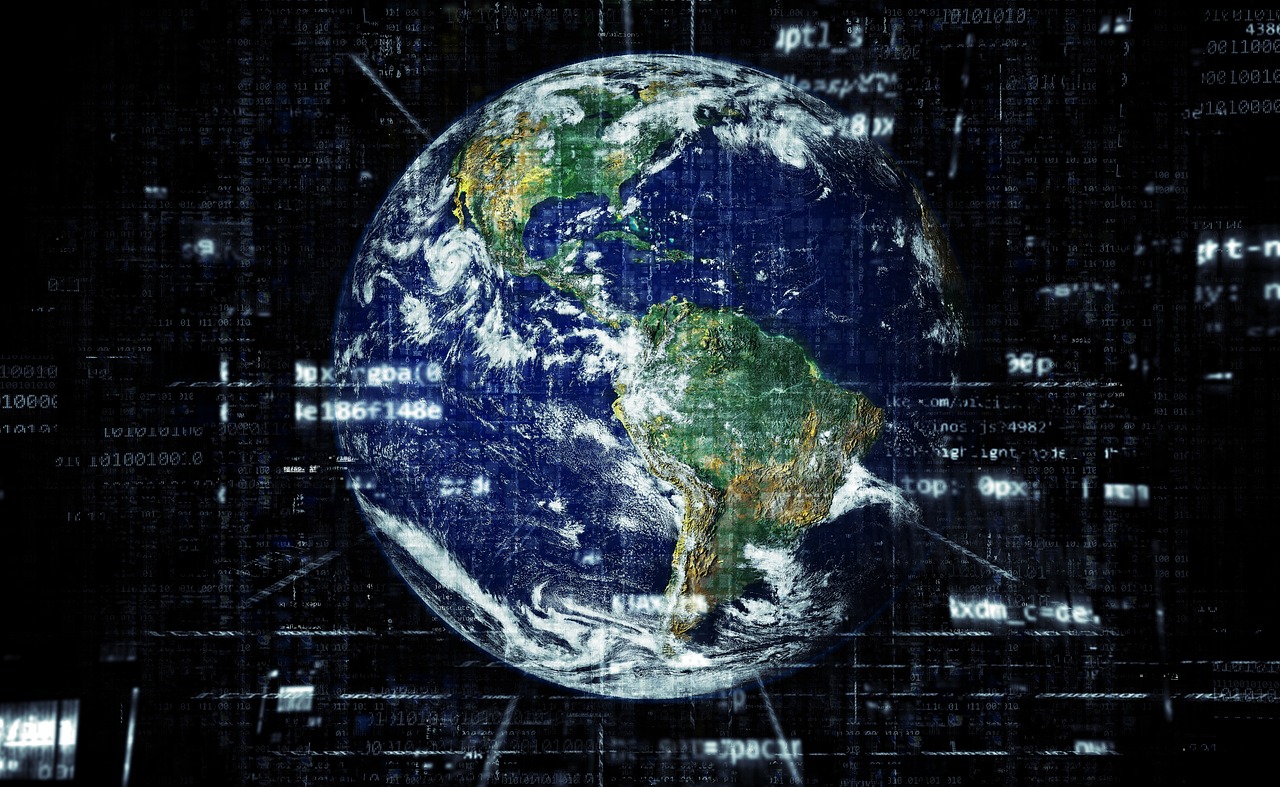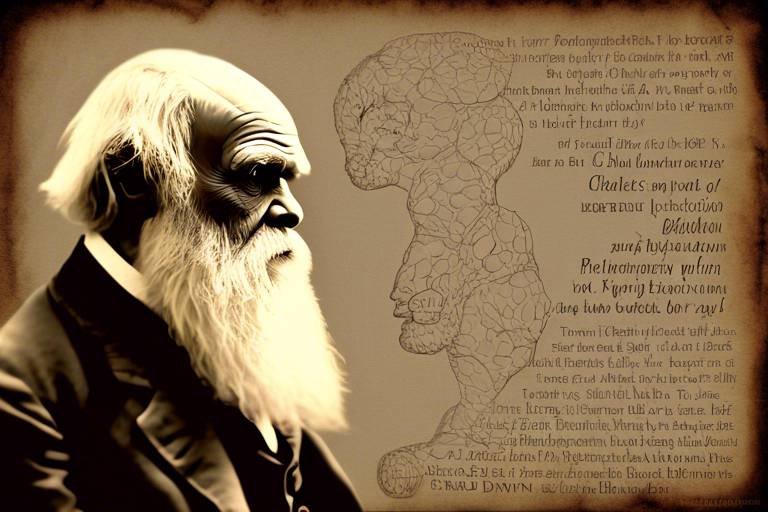The Philosophical Concepts That Drive Our Technological World
In today's fast-paced digital landscape, technology is not just a tool; it’s a fundamental part of our existence. It shapes our interactions, influences our decisions, and even redefines our identities. But have you ever paused to consider the philosophical underpinnings that guide these advancements? The intersection of philosophy and technology is a rich tapestry woven with ideas that challenge our perceptions and ethical frameworks. From the moral responsibilities of tech companies to the existential questions raised by our digital lives, understanding these concepts is crucial as we navigate the complexities of modern society.
As we delve into the philosophical concepts that drive our technological world, we realize that each innovation comes with a set of ethical dilemmas. Think about it: every time we share a moment on social media, we’re not just connecting; we’re also making choices that reflect our values and beliefs. This duality is what makes the exploration of these ideas so fascinating. It’s not merely about what technology can do, but also about what it should do and the implications it carries for our collective future.
The role of technology in shaping our lives cannot be overstated. It influences everything from our daily routines to our broader societal structures. As we move forward, we must ask ourselves: Are we shaping technology, or is technology shaping us? This question encapsulates the essence of the philosophical debates surrounding technological determinism, ethics, and human existence. By engaging with these ideas, we can better understand our relationship with technology and its impact on our lives.
In the sections that follow, we will explore various philosophical concepts that illuminate the relationship between technology and society. We'll dive into ethical considerations that guide tech development, existentialist thoughts that shape our identity in the digital age, and the implications of technological determinism on social structures. Each of these areas offers unique insights that can help us navigate the challenges and opportunities presented by our increasingly technological world.
- What is technological determinism? Technological determinism is a theory that suggests technology is the primary driver of societal change, influencing social structures and cultural values.
- How does ethics play a role in technology? Ethics guide decision-making in technology, addressing issues such as privacy, surveillance, and the responsibilities of tech companies to their users.
- What is existentialism in the context of technology? Existentialism raises questions about identity, freedom, and authenticity in our interactions with technology, especially in a world dominated by digital platforms.
- What are the implications of posthumanism? Posthumanism challenges traditional human-centric views, exploring how emerging technologies like AI and biotechnology could redefine what it means to be human.

Ethics in Technology
In today's rapidly evolving technological landscape, the question of ethics looms larger than ever. As we integrate technology into every facet of our lives, the ethical implications of its use become critical. From the way we handle personal data to the impacts of artificial intelligence on employment, ethical considerations guide our decisions and shape our societal norms. The philosophical frameworks behind these ethical considerations help us navigate the murky waters of technology's role in our lives.
At the heart of the ethical debate in technology lies the issue of privacy. In a world where our every click, like, and share is tracked and analyzed, the question arises: how much of our personal information are we willing to sacrifice for convenience? Tech giants often argue that data collection is essential for improving user experience, but at what cost? This dilemma invites us to reflect on the moral responsibilities of tech companies. Should they prioritize profit over the privacy of their users? Or should they take a more ethical approach, ensuring that user data is protected and used responsibly?
Moreover, surveillance has become a pervasive element of modern life. With the rise of smart devices and constant connectivity, individuals are often under the watchful eye of various technologies. This raises profound ethical questions: Who is watching us? For what purpose? And how does this surveillance affect our freedom? The balance between security and personal freedom is a delicate one, and philosophical ethics can provide a framework for understanding where that balance should lie.
Another critical aspect of ethics in technology revolves around the moral responsibilities of tech companies. As they develop new technologies, they must consider the potential consequences of their innovations. For instance, algorithms that govern social media feeds can create echo chambers, influencing public opinion and potentially leading to societal polarization. It's crucial for these companies to recognize their role in shaping societal discourse and to act responsibly. This responsibility extends to ensuring that their technologies do not perpetuate biases or inequalities, which can have far-reaching effects on marginalized communities.
Ultimately, the intersection of ethics and technology is a complex landscape that requires ongoing dialogue and reflection. As we continue to innovate, we must also remain vigilant about the ethical implications of our creations. This means not only adhering to current ethical standards but also anticipating future challenges. By fostering a culture of ethical awareness in technology, we can strive to create a world where innovation and morality go hand in hand.
- What are the main ethical concerns in technology? The primary concerns include privacy, surveillance, and the moral responsibilities of tech companies.
- How do tech companies ensure ethical practices? Companies can implement ethical guidelines, conduct regular audits, and engage in transparent communication with users.
- Why is privacy important in the digital age? Privacy is crucial for protecting individual rights and freedoms, and it fosters trust between users and technology providers.
- What role does philosophy play in technology ethics? Philosophy provides frameworks for understanding complex ethical dilemmas, guiding decision-making in technology development.

Existentialism and Technology
In today's fast-paced digital landscape, the intersection of existentialism and technology raises profound questions about our very existence. Existentialism, a philosophical movement that emphasizes individual freedom, choice, and the search for meaning, challenges us to consider how technology shapes our identity and authenticity. As we navigate a world increasingly dominated by screens and algorithms, we must ask ourselves: Are we truly free in our choices, or are we merely products of the technology we use?
One of the most intriguing aspects of existentialist thought is its focus on the individual. In a society where technology mediates our relationships and experiences, we often find ourselves grappling with the essence of our identity. Are we defined by our online personas, or is there a deeper sense of self that transcends the digital realm? This question becomes even more pressing as social media platforms encourage us to curate our lives for public consumption, often leading to a dissonance between our true selves and the identities we project online.
Moreover, the concept of digital alienation emerges as a significant concern. Despite being more connected than ever, many individuals report feelings of loneliness and isolation. This paradox can be traced back to existentialist ideas about the human condition. The philosopher Martin Heidegger spoke of 'being-in-the-world,' suggesting that our existence is fundamentally tied to our relationships and interactions. Yet, in a world where face-to-face communication is often replaced by text messages and video calls, we must ponder: Are we truly engaging with one another, or are we merely existing alongside each other in a digital haze?
The impact of technology on human existence cannot be overstated. As we immerse ourselves in virtual environments, the lines between reality and simulation blur. This raises critical questions about authenticity. Are we living genuine lives, or are we merely playing roles dictated by societal expectations and technological norms? The existentialist perspective encourages us to reclaim our agency in this digital age, urging us to seek out authentic experiences that resonate with our true selves.
To navigate these challenges, we can draw on existentialist principles that emphasize the importance of self-exploration and personal responsibility. By reflecting on our values and choices, we can cultivate a sense of authenticity that transcends the superficiality often found in online interactions. This journey of self-discovery may involve:
- Engaging in meaningful conversations with others.
- Taking breaks from social media to reconnect with our inner selves.
- Exploring creative outlets that express our true identity.
Ultimately, the relationship between existentialism and technology is complex and multifaceted. As we continue to grapple with the implications of our digital lives, it is essential to remain mindful of the philosophical questions that arise. By doing so, we can navigate the challenges of the digital age with a sense of purpose and authenticity.
In the realm of technology, the concepts of freedom and choice are often intertwined with existentialist thought. As we engage with various technologies, we must consider how these tools influence our ability to make choices. Are we exercising free will, or are we being nudged towards predetermined paths by algorithms and design choices? This tension between autonomy and automation is a key area of exploration in understanding our relationship with technology.
As we ponder these questions, one thing becomes clear: the philosophical implications of technology are vast and deeply intertwined with our understanding of what it means to be human. By embracing existentialist ideas, we can better navigate the complexities of our technological world, fostering a deeper connection with ourselves and others.
Q: How does technology impact our sense of identity?
A: Technology can shape our identity by influencing how we present ourselves online. It often encourages us to curate our lives for public viewing, which can lead to a disconnect between our true selves and our online personas.
Q: What is digital alienation?
A: Digital alienation refers to the feelings of loneliness and disconnection that can arise despite being constantly connected through technology. It highlights the paradox of modern communication where we may be more connected yet feel more isolated.
Q: How can we find authenticity in a digital world?
A: To find authenticity, we can engage in self-reflection, prioritize meaningful interactions, and take breaks from social media to reconnect with our true selves.

Technology and Human Existence
Technology has become an inseparable part of our daily lives, shaping not just how we communicate, but also how we perceive our very existence. In a world where the digital and physical realms intertwine seamlessly, we often find ourselves pondering profound questions: What does it mean to be human in the age of technology? Are we losing our essence as we become more intertwined with machines? These questions are not merely philosophical musings; they are crucial inquiries that resonate deeply in our digital age.
As we navigate through life, technology surrounds us, influencing our interactions, thoughts, and even our identities. Consider how social media platforms allow us to curate our lives, presenting a polished version of ourselves to the world. This leads to a paradox: while we are more connected than ever, we may feel increasingly isolated. The ease of sharing our lives online can foster a sense of community, yet it can also breed feelings of alienation as we compare our realities to the seemingly perfect lives of others.
In this context, the impact of technology on our understanding of human existence can be broken down into several key themes:
- Alienation: Despite the constant connectivity, many individuals report feeling a sense of detachment from their surroundings and even from themselves.
- Connection: Technology can foster genuine connections, allowing people to maintain relationships across great distances.
- Identity: Our digital identities often reflect a curated version of ourselves, leading to questions about authenticity.
One of the most significant implications of our reliance on technology is the concept of digital alienation. This phenomenon refers to the emotional and psychological distance that can arise when we engage with others primarily through screens rather than face-to-face interactions. The irony is palpable: we are connected, yet we often feel more alone. The philosophical roots of this alienation can be traced back to existentialist thinkers who warned of the dangers of losing touch with our true selves amidst the noise of modern life.
Furthermore, the quest for authenticity in the digital age is fraught with challenges. As we navigate platforms filled with filtered images and highlight reels, we must ask ourselves: Are we presenting our true selves, or are we merely performing for an audience? The existentialist perspective encourages us to seek authenticity in our interactions, urging us to embrace our imperfections and vulnerabilities rather than hide behind a digital facade.
Ultimately, technology's influence on human existence is a double-edged sword. It offers unprecedented opportunities for connection and expression, yet it also poses significant risks to our mental health and sense of self. As we move forward in this technological landscape, it is essential to remain aware of these dynamics, striving for a balance that allows us to harness the benefits of technology while safeguarding our humanity.
Below are some common questions regarding the relationship between technology and human existence:
- How does technology impact our social relationships?
Technology can enhance communication but may also lead to superficial interactions that lack depth. - What is digital alienation?
Digital alienation refers to feelings of isolation despite being constantly connected through technology. - Can technology help us find authenticity?
While technology can complicate authenticity, it also offers platforms for genuine self-expression if used mindfully.

Digital Alienation
In our hyper-connected world, where social media notifications ping incessantly and video calls replace face-to-face conversations, the concept of has become increasingly relevant. This term refers to the paradox of feeling isolated and disconnected, even while we are constantly plugged into digital networks. It's almost like being in a crowded room but still feeling utterly alone. Have you ever scrolled through your social media feed, surrounded by images of friends and family, yet felt a deep sense of loneliness? This is the essence of digital alienation.
The philosophical roots of digital alienation can be traced back to existentialist thinkers who emphasized the importance of authentic human connections. As we immerse ourselves in virtual environments, we often sacrifice genuine interactions for curated online personas. This shift raises critical questions: Are we losing our ability to connect meaningfully? Are we trading depth for breadth in our relationships?
To understand digital alienation more profoundly, consider the following aspects:
- Isolation in Connectivity: While technology promises to bring us closer, it often leads to superficial connections. The emphasis on likes, shares, and followers can overshadow the value of deep, personal relationships.
- Impact on Mental Health: Studies have shown that excessive use of social media can lead to increased feelings of anxiety and depression. The constant comparison to others' highlight reels can distort our self-image and exacerbate feelings of inadequacy.
- Community Erosion: As we engage more with online communities, local connections may weaken. The neighborhood coffee shop where people once gathered is often replaced by virtual chats, leading to a loss of physical community bonds.
Philosophically, digital alienation challenges us to rethink our relationship with technology. Are we the masters of our devices, or have we become subservient to them? The existentialists might argue that we must reclaim our agency by fostering authentic connections, both online and offline. We can combat digital alienation by consciously choosing to engage in meaningful interactions, prioritizing quality over quantity.
In conclusion, while technology can facilitate communication, it is vital to recognize its potential to alienate us. By understanding the philosophical implications of digital alienation, we can take proactive steps to ensure that our digital lives enrich rather than diminish our human experience.
- What is digital alienation? Digital alienation refers to the feeling of isolation and disconnection that individuals may experience despite being constantly connected through technology.
- How does social media contribute to digital alienation? Social media can create superficial relationships, leading to feelings of loneliness and inadequacy as users compare their lives to others' curated online personas.
- What can be done to combat digital alienation? To combat digital alienation, it's essential to prioritize authentic interactions, engage in meaningful relationships, and balance online and offline activities.

Authenticity in the Digital Age
In a world where our lives are increasingly lived online, the concept of authenticity takes on new dimensions. Imagine scrolling through your social media feed, where every post is meticulously curated, every smile perfectly staged. It raises a pressing question: Are we truly being ourselves, or just versions of ourselves that we want the world to see? This dilemma is at the heart of the existentialist discourse on authenticity, especially in the digital age.
As we navigate through platforms that encourage sharing, we often find ourselves grappling with a paradox. While technology connects us, it also creates a facade—an illusion of closeness that can feel superficial. The existentialist perspective highlights this struggle, suggesting that our online personas may diverge significantly from our true selves. The pressure to present a polished image can lead to feelings of inadequacy and disconnection, making us question our own identities.
To understand this concept better, let’s consider a few key points:
- Social Media as a Performance: Every post can feel like a performance, where likes and comments serve as validation. This can distort our sense of self-worth.
- Curated Lives: The ability to edit and filter our experiences can lead to a disconnect between our online and offline lives, causing a sense of alienation.
- Pressure to Conform: Trends and viral content can pressure individuals to conform to certain standards of authenticity, which may not reflect their true selves.
Furthermore, the existentialist lens encourages us to reclaim our authenticity by embracing our unique experiences and perspectives. It challenges us to ask ourselves: What does it mean to be authentic in a world that often rewards the inauthentic? By recognizing the constructed nature of our online identities, we can begin to navigate the complexities of authenticity with greater awareness.
As we ponder these questions, it’s essential to recognize that authenticity is not a destination but a journey. It’s about finding a balance between our online presence and our real-world selves. In doing so, we can foster deeper connections and embrace our true identities, both on and off the screen. The challenge lies in resisting the urge to conform to societal expectations and instead, celebrating our individuality in a world that often seeks to homogenize.
Ultimately, the quest for authenticity in the digital age is a reflection of our broader human experience. It invites us to explore who we are beneath the surface and how we can express that in a way that feels genuine. As we continue to engage with technology, let’s strive to be more than just pixels on a screen—let’s be real, let’s be authentic.
- What is authenticity in the digital age? Authenticity in the digital age refers to the challenge of presenting one's true self amidst curated online personas and social media pressures.
- Why is authenticity important? Authenticity fosters genuine connections, enhances self-esteem, and allows individuals to express their true identities without fear of judgment.
- How can I be more authentic online? To be more authentic online, focus on sharing real experiences, embracing imperfections, and engaging with your audience in a meaningful way.

Freedom and Choice
In today's world, the intersection of technology and our notions of freedom and choice is a hotly debated topic. As we navigate through our digital lives, we often find ourselves questioning how much control we truly have over our decisions. Are we the masters of our own choices, or are we mere puppets dancing to the tune of algorithms and data analytics? This philosophical inquiry is crucial as it sheds light on the implications of technology on human autonomy.
One of the most striking aspects of technology is its ability to provide us with seemingly endless options. From streaming services that offer thousands of movies at our fingertips to social media platforms that connect us with friends and strangers alike, it appears that we are living in an era of unparalleled freedom. However, this abundance can be misleading. The paradox of choice suggests that having too many options can lead to anxiety and indecision. Instead of feeling liberated, we may end up feeling overwhelmed, unable to make a choice. This is where the philosophical implications of freedom come into play.
Moreover, as technology continues to advance, the lines between convenience and control blur. For instance, consider how recommendation algorithms on platforms like Netflix or Amazon shape our preferences. While they might seem helpful, they also limit our exposure to options outside of our established tastes. Are we truly free if our choices are subtly guided by unseen forces? This brings us to the concept of technological nudging, where technology influences our decisions in ways we might not even realize. We might think we're making independent choices, but are we just following the path laid out for us by data-driven insights?
Furthermore, the rise of automation and artificial intelligence raises profound questions about the future of work and personal agency. As machines take over tasks traditionally performed by humans, we face a dilemma: does this enhance our freedom by freeing us from mundane tasks, or does it restrict our choices by limiting employment opportunities? The balance between embracing technological advancements and safeguarding our autonomy is a delicate one.
To explore these ideas further, let's consider a few key points:
- Autonomy vs. Convenience: The convenience of technology should not come at the cost of our autonomy. We must remain vigilant about how our choices are influenced.
- Awareness of Algorithms: Understanding how algorithms work can empower us to make more conscious choices rather than passively accepting recommendations.
- Future of Work: We need to critically assess how automation affects our job market and personal freedom, ensuring that we adapt and thrive in an evolving landscape.
Ultimately, the relationship between technology, freedom, and choice is complex and multifaceted. As we continue to embrace new innovations, it's essential to engage in these philosophical discussions, ensuring that our technological future aligns with our values and preserves our autonomy. After all, in a world increasingly defined by technology, the essence of being human lies in our ability to choose—freely and authentically.
- How does technology impact our freedom of choice?
Technology can both enhance and limit our freedom of choice, depending on how it is designed and utilized. - What is technological nudging?
Technological nudging refers to the subtle ways in which technology can influence our decisions, often without us realizing it. - Are we losing our autonomy due to automation?
While automation can free us from mundane tasks, it also raises concerns about job displacement and the potential loss of personal agency.

Technological Determinism
is a concept that suggests technology is the primary driver of societal change, shaping not only our daily lives but also the very structure of our societies. This idea can be both fascinating and alarming, as it raises questions about the extent to which we are in control of our technological creations versus being controlled by them. Imagine technology as a powerful river; while we can build dams and channels, the flow of the water often dictates the landscape around it. In this section, we will explore how this philosophical perspective influences our understanding of social dynamics and cultural evolution.
At its core, technological determinism posits that advancements in technology lead to inevitable changes in society. For instance, the invention of the internet has transformed communication, commerce, and even our personal relationships. It’s hard to deny that the way we interact with one another has been fundamentally altered. But is this transformation a natural progression, or are we simply following the path laid out by the technologies we create? This question is at the heart of the debate surrounding technological determinism.
To illustrate this concept, we can look at several historical examples where technology has reshaped social structures:
- The Printing Press: This invention revolutionized the way information was disseminated, leading to the spread of ideas and ultimately the Renaissance and the Reformation.
- The Industrial Revolution: The introduction of machinery changed labor dynamics, leading to urbanization and the creation of modern economies.
- Social Media: Platforms like Facebook and Twitter have changed how we communicate, often leading to new forms of social interaction and even political movements.
However, while technological determinism emphasizes the power of technology, it also invites critiques that highlight the role of human agency. Critics argue that it oversimplifies the relationship between society and technology, ignoring the complexities of human choice and cultural context. For example, while smartphones have changed the way we communicate, it is ultimately our choices and behaviors that dictate how we use these devices. This debate leads us to consider an essential question: Are we the masters of our technology, or are we merely its servants?
Moreover, the implications of technological determinism extend beyond mere analysis; they raise ethical considerations about responsibility and accountability. If technology is the driving force behind social change, then what responsibilities do creators and innovators have? Should tech companies be held accountable for the societal impacts of their products? This is a crucial discussion in today’s world, where technologies like artificial intelligence and surveillance systems can have profound effects on privacy and civil liberties.
In conclusion, understanding technological determinism is vital for anyone looking to navigate the modern landscape of innovation and societal change. It serves as a reminder that while technology can drive progress, it is essential to remain aware of the ethical implications and the potential for misuse. As we continue to innovate, we must ask ourselves: How can we ensure that technology serves humanity rather than the other way around?
- What is technological determinism? Technological determinism is the theory that technology is the primary factor driving societal change.
- Can technology shape our values? Yes, technology can influence societal values and norms, often redefining how we interact with one another.
- What are the criticisms of technological determinism? Critics argue that it oversimplifies the relationship between technology and society, neglecting the role of human agency.
- How does technological determinism relate to ethics? It raises questions about the responsibilities of tech creators and the societal impacts of their innovations.

Impact on Social Structures
The advent of technology has been nothing short of revolutionary, reshaping our social structures in ways that are profound and often unpredictable. Imagine a world where communication is instantaneous, where information flows freely and is accessible at the click of a button. This is the reality we live in today, yet it comes with a complex web of implications that challenge our traditional notions of social hierarchy, relationships, and power dynamics.
Technological advancements have not only changed how we interact but have also redefined the very fabric of our societies. For instance, consider the rise of social media platforms. These platforms have democratized information dissemination, allowing anyone with internet access to share their thoughts and ideas. Consequently, this has led to a more egalitarian space where voices that were once marginalized can now be amplified. However, this shift has also resulted in new forms of social stratification, where digital influence and follower counts can dictate social status, creating a new kind of hierarchy based on online presence.
Moreover, the impact of technology on social structures can be observed through the lens of employment. Automation and artificial intelligence are transforming job markets, leading to the displacement of traditional roles while simultaneously creating new opportunities. This phenomenon raises critical questions about the future of work and the skills needed to thrive in an increasingly automated world. As we witness industries evolving, the challenge lies in ensuring that the workforce is equipped to adapt to these changes. The disparity in access to technology and education can exacerbate existing inequalities, leading to a divide between those who can navigate this new landscape and those who cannot.
Another significant aspect to consider is how technology influences our relationships. The way we connect with one another has shifted dramatically; face-to-face interactions have given way to digital conversations, often leaving us feeling more isolated despite being more "connected." This paradox can lead to a sense of alienation, as individuals may struggle to form genuine connections in a virtual environment. The implications for mental health and community cohesion are profound, as the quality of our interactions often matters more than the quantity.
In summary, the impact of technology on social structures is multifaceted. It challenges us to rethink our understanding of power, relationships, and community. As we navigate this complex landscape, it becomes increasingly important to foster discussions about the ethical implications of technological advancement. By doing so, we can work towards a future where technology serves to enhance human connection rather than diminish it.
- How does technology influence social hierarchies?
Technology can create new forms of social stratification, such as influence based on social media presence, while also democratizing information access.
- What are the implications of automation on employment?
Automation can displace traditional jobs but also create new opportunities, necessitating a workforce that is adaptable and skilled in new technologies.
- Can technology lead to social isolation?
Despite increased connectivity, technology can sometimes result in feelings of alienation as digital interactions replace face-to-face communication.

Critiques of Determinism
When we talk about technological determinism, we're diving into a theory that suggests technology is the primary driver of societal change. However, this perspective has faced significant criticism from various philosophical standpoints. Critics argue that this theory oversimplifies the complex relationship between society and technology. They believe that while technology does influence social structures, it is not the sole factor in shaping our world. Instead, human agency plays a critical role in how technologies are developed and utilized.
One of the primary critiques is that technological determinism often ignores the contextual factors that influence technological development. For instance, cultural, economic, and political conditions can significantly affect how technology is adopted and adapted. This means that the impact of technology cannot be viewed in isolation; it must be understood as part of a larger narrative that includes human choices and societal values. In this sense, technology is more of a tool that reflects human intentions rather than a force that dictates our actions.
Moreover, critics emphasize the importance of human agency in shaping technology. They argue that people are not merely passive recipients of technological advancements; rather, they actively engage with, modify, and even resist these changes. For example, consider the rise of social media. While it has transformed communication, its impact on society is heavily influenced by how individuals choose to use it. Are they fostering genuine connections, or are they using it to curate an idealized version of their lives? This choice reflects individual autonomy in the face of technological pressure.
Another critical point is that technological determinism can lead to a fatalistic attitude towards technology, where people might feel powerless to change the trajectory of technological advancements. This perspective can stifle innovation and creativity, as individuals may believe that they cannot influence the direction technology takes. Instead, a more nuanced view recognizes that while technology can shape possibilities, it is ultimately up to society to decide how to harness these tools for the greater good.
To illustrate these critiques, let’s consider a few examples:
| Technology | Deterministic View | Critique |
|---|---|---|
| Social Media | Increases connectivity and community. | Can lead to superficial relationships and mental health issues. |
| Artificial Intelligence | Replaces human jobs and decision-making. | Can augment human capabilities and create new job opportunities. |
| Smartphones | Enhances communication. | May lead to decreased face-to-face interactions and increased distraction. |
In conclusion, while technological determinism provides a framework for understanding the influence of technology on society, it is essential to recognize its limitations. The interplay between technology and society is dynamic and complex, shaped by human choices and cultural contexts. By embracing a more holistic view, we can better navigate the challenges and opportunities that arise from our technological landscape.
- What is technological determinism?
Technological determinism is the theory that technology is the primary influence on social change and structures. - Why is human agency important in the context of technology?
Human agency emphasizes that individuals actively shape and influence how technology is used, rather than being passive recipients of technological change. - Can technology be both beneficial and harmful?
Yes, technology can have both positive and negative impacts on society, depending on how it is used and the context in which it is applied.

Posthumanism and the Future
As we stand on the brink of unprecedented technological advancements, the concept of posthumanism emerges as a profound philosophical framework that challenges our traditional understanding of what it means to be human. In a world increasingly dominated by artificial intelligence, biotechnology, and virtual realities, posthumanism invites us to reconsider our identity, agency, and relationship with technology. Rather than viewing technology as a mere tool for human enhancement, posthumanism posits that technology fundamentally reshapes our existence and the very fabric of society.
At its core, posthumanism suggests that the boundaries between humans and machines are becoming increasingly blurred. This raises intriguing questions about our future: Are we on the path to becoming something greater than human, or are we risking our humanity in the process? As we integrate technology into our daily lives—whether through wearable devices, AI companions, or genetic modifications—we must grapple with the implications of these changes. The philosophical discourse surrounding posthumanism emphasizes the need to critically examine how these technologies influence our understanding of identity, consciousness, and morality.
One of the most significant aspects of posthumanism is its challenge to the anthropocentric worldview. Traditionally, humans have seen themselves as the pinnacle of evolution, placing nature and non-human entities in subordinate roles. However, posthumanism advocates for a more inclusive perspective, recognizing the interconnectedness of all beings—human and non-human alike. This shift in thinking encourages us to consider ethical implications in our interactions with technology and the environment. For instance, as we develop AI systems that mimic human behavior, the question arises: What rights and responsibilities do we owe to these entities?
To illustrate the impact of posthumanism on our future, consider the following table that outlines key technologies and their implications:
| Technology | Implications |
|---|---|
| Artificial Intelligence | Challenges notions of consciousness and agency; raises ethical concerns about autonomy and decision-making. |
| Biotechnology | Redefines human capabilities; poses questions about genetic manipulation and the essence of being human. |
| Virtual Reality | Transforms perceptions of reality and identity; blurs the lines between real and simulated experiences. |
As we navigate this brave new world, we must also confront the ethical dilemmas posed by emerging technologies. The integration of AI into our lives, for example, raises significant questions about privacy, autonomy, and the essence of human relationships. Are we sacrificing our ability to connect with one another in meaningful ways as we increasingly rely on digital interactions? The posthumanist perspective encourages us to reflect on these issues, urging us to seek a balance between embracing technological advancements and preserving our humanity.
Ultimately, the future shaped by posthumanism is not predetermined; it is a collective endeavor that requires active participation and critical reflection. As we continue to innovate and explore the potential of technology, we must remain vigilant about the ethical and philosophical implications of our choices. By engaging in these discussions, we can ensure that the evolution of our species is not only about technological progress but also about enriching our understanding of what it means to be human in an increasingly complex world.
- What is posthumanism? Posthumanism is a philosophical framework that challenges traditional notions of humanity, emphasizing the interconnectedness of humans and technology.
- How does technology influence our identity? Technology reshapes our identity by altering our interactions, perceptions, and experiences, leading to new forms of self-expression and connection.
- What ethical concerns arise from posthumanism? Ethical concerns include questions about rights and responsibilities towards AI, the implications of genetic modifications, and the impact of technology on human relationships.
- Can we preserve our humanity in a posthuman future? Yes, by actively engaging in discussions about technology's role in society, we can strive to maintain our humanity while embracing innovation.
Frequently Asked Questions
- What is the role of ethics in technology?
Ethics in technology is essential as it guides how tech companies make decisions that affect users and society. It addresses critical issues such as privacy, surveillance, and the moral responsibilities of developers to ensure their innovations benefit humanity rather than harm it.
- How does existentialism relate to our use of technology?
Existentialism raises profound questions about identity and authenticity in our interactions with technology. In a world dominated by digital experiences, we often find ourselves grappling with who we are and how we present ourselves online, reflecting on the true nature of our existence.
- What is digital alienation and why is it a concern?
Digital alienation refers to the feelings of disconnection and loneliness that can arise despite being constantly connected through technology. This phenomenon can impact mental health and community bonds, making it crucial to explore its philosophical roots and implications.
- How does technology influence our freedom and choices?
Technology significantly impacts our notions of freedom and choice, often leading to debates about autonomy in an automated world. As we rely more on algorithms and AI for decision-making, we must consider how this affects our ability to make independent choices.
- What is technological determinism?
Technological determinism is the idea that technology shapes society's structure and values. This perspective suggests that technological advancements can lead to social change, influencing everything from power dynamics to interpersonal relationships.
- What are some critiques of technological determinism?
Critiques of technological determinism emphasize the importance of human agency in shaping technology. These perspectives highlight the interplay between society and technological development, suggesting that while technology influences us, we also have the power to influence technology.
- How does posthumanism challenge traditional views of humanity?
Posthumanism challenges the conventional human-centric perspective by exploring how emerging technologies like AI and biotechnology could redefine what it means to be human. This philosophy encourages us to rethink our relationship with technology and consider new possibilities for existence.



















